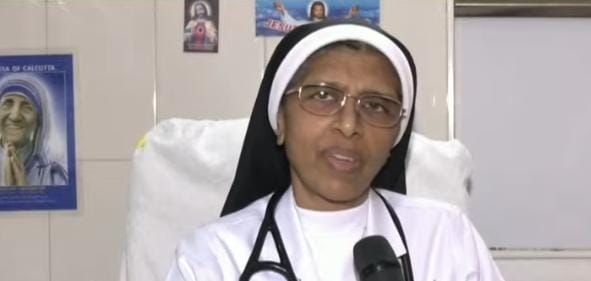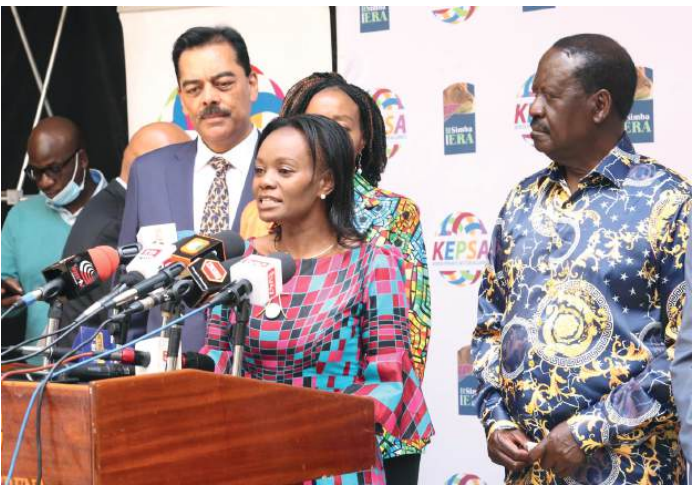
 Kenya Private
Sector Alliance
leadership, led
by former
chairman and
Bidco CEO Vimal
Shah and CEO
Carole Kariuki, address the
media after an
engagement
meeting with
the late former
Prime Minister
Raila Odinga
during the
run-up to the
2022 General
Elections
/ FILE
Kenya Private
Sector Alliance
leadership, led
by former
chairman and
Bidco CEO Vimal
Shah and CEO
Carole Kariuki, address the
media after an
engagement
meeting with
the late former
Prime Minister
Raila Odinga
during the
run-up to the
2022 General
Elections
/ FILE
Kenya's long-serving politician, Raila Odinga, was widely recognised for his political achievements over the past three decades. However, the man who has over the years, been an advocate for reforms and democratic governance, a major figure in shaping Kenya’s modern politics, also had a hand in shaping the country’s business policies, drove regional integration and development, and was an investor himself.
He quietly built a multi-billion-shilling business empire that has remained largely out of the public spotlight, with investments, together with family and partners, spanning oil and gas industries, real estate, manufacturing and agriculture, among other ventures.
In a recent interview with the Star, one of Raila’s nephews revealed that it has not been easy for the family and investing has always been a journey similar to any other entrepreneur in Kenya.
Raila, in a social media videopost in June 2021 narrated how he started his journey into entrepreneurship from scratch. At some point, he was forced to sell his Opel left-hand drive car to finance the acquisition of equipment from an Indian entrepreneur who had been exiled from Uganda and was keen on disposing of his assets.
He used the money from the car sale to acquire machines that he used to set up his manufacturing company, which is at the core of his multi-billion-dollar business empire.
“The entire machinery was being sold at Sh12,000 which I didn’t have. My salary was only Sh2,000 so I sold my car to raise the cash and that is how I started East Africa Spectre Company,” Odinga had said.
Spectre International Limited was incorporated on January 27, 1989, with shareholders being Lennox Development Ltd, Kisumu Development Trust Company Ltd, Oakland Ventures Ltd and his family members as lead directors.
From manufacturing steel-related products and selling them in the Kenyan market, the company would later attract the attention of a businessman from Agip Oil Company, who challenged Raila to venture into the production of gas cylinders, citing a deficiency in the market, a challenge the engineer took.
Today, East Africa Spectre Company, whose current market value is not public, is one of the top manufacturers of gas cylinders in East and Central Africa.
Raila and his family also own a substantial stake in Be Energy, the local arm of a multinational founded by Saudi Arabian tycoon Sheik Abdul Kader Al Bakri. Be Energy held a market share of approximately 3.72 per cent in the local petroleum industry as of March this year, according to industry data, and was fifth after Vivo Energy, which operates the Shell brand, Rubis, TotalEnergies and Ola Energy.
Raila’s family is also linked to Lennox Development Ltd, which focuses on real estate investment and property development and Duma Investments, which operates as a private investment company with interests in finance, real estate and agriculture, among others.
His most recent investment is in the Sh120 billion mixed-use LV Marina in Kisumu, a real estate project being developed by his close ally Suleiman Shahbal’s GulfCap Real Estate.
LV Marina spans 285 acres on the Odinga’s defunct molasses plant site. He is also a shareholder in other firms, with his family investing widely in key sectors of the economy.
Raila’s net worth is not clear, in what business analysts say is a result of the dynamic nature of business valuations and the lack of disclosures, being that his companies are private, but it is estimated to be in millions of dollars.
The former Prime Minister will also be remembered for championing growth in the private sector and job creation. On Wednesday, the Kenya Private Sector Alliance (Kepsa) mourned him as “one of Kenya’s greatest statesmen,” noting his dedication to the country, which went beyond politics to economic prosperity.
During his tenure as Prime Minister (2008-2013), he became the first leader to institutionalise the Prime Minister’s Roundtable with the private sector in 2010.
The forum established a critical, high-level mechanism for collaboration between government and industry, directly addressing bottlenecks and shaping policy for a better investment climate.
“Now known as the Kepsa Prime Minister’s Roundtable, this pioneering initiative significantly contributed to improving the ease of doing business and remains a foundational component of public-private engagement in Kenya today,” Kepsa chief executive Carole Kariuki said in a statement yesterday.
According to Kariuki, Raila’s deep commitment and actions to empowering the private sector as the key driver of inclusive wealth creation, economic growth, and job creation for Kenyans laid a crucial groundwork for the sustained partnership Kepsa enjoys with the government.
This involved investing in expanding key growth areas like the digital economy and circular economy, as well as strengthening value chains in productive sectors with closer ties to MSMEs.
“We cherish the memory of his tireless efforts to move the nation forward, foster an environment of dialogue and champion reforms that have had a lasting, positive impact on the business community and the country.”
Shippers Council of Eastern Africa (SCEA) CEO Agayo Ogambi said: “The improved road networks are credited to his work as Prime Minister and Minister for Roads.”
“He appreciated the importance of good infrastructure and good business environment and was a firm believer that supporting the private sector was critical to the country’s growth and development. His work will live for years to come.”
Raila was instrumental in driving economic growth in the post-election violence period, which rebounded from a 2008 contraction, averaging 5-6 per cent GDP growth annually through 2012, driven by restored investor confidence, manufacturing and agricultural recovery.
Kenya Association of Manufacturers CEO Tobias Alando yesterday said the country has lost “a statesman and champion of manufacturing sector growth.”
“He consistently called for policy reforms and included industry priorities in his manifestos. During his tenure as the Prime Minister, he convened a series of roundtables to address impediments to the creation of a conducive business environment, giving the manufacturing sector a much-needed impetus,” Alando said.
Raila was instrumental in the construction and rehabilitation of key roads that greatly improved access to raw materials and enhanced market access for Kenya’s manufacturing sector during his time as Roads, Public Works and Housing Minister, KAM noted.
Away from Kenya, Raila played a pivotal role in driving the African growth agenda, with a keen focus on infrastructure development, trade integration and job creation—a Pan-Africanist who had a dream for the continent.
As the African Union High Representative for Infrastructure Development (2018-2021), he championed regional development with a keen focus on missing links along the transnational highway corridors identified as part of the Trans-African Highways Network, with a view to facilitating their development and modernisation.
He provided input into the Lamu Port, South Sudan, Ethiopia Transport Corridor (LAPSSET corridor programme), which is Eastern Africa’s largest and most ambitious infrastructure project.
Raila believed that African countries should be able to trade freely among themselves through the African Continental Free Trade Area, and the skies should be open through the Single African Air Transport Market.
“For all this to happen, we need to stay focused on the priority infrastructure projects and start with the key ones already identified in PIDA (Programme for Infrastructure Development in Africa) and Agenda 2063. Having an integrated approach will help us realise quick wins,” he said during a forum he had attended in Johannesburg.
















